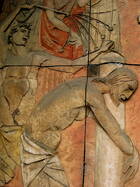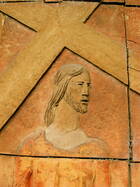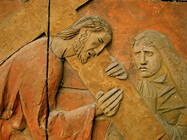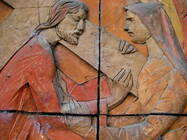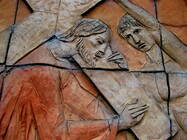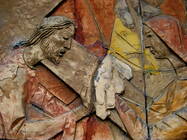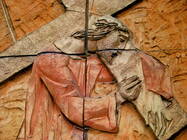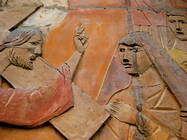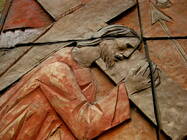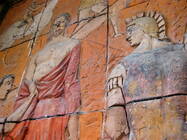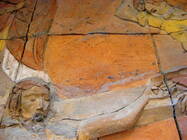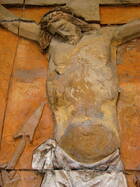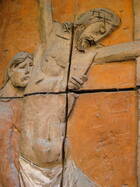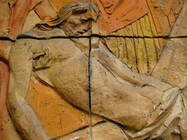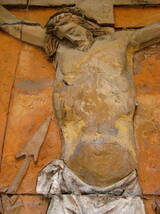
Stations of the Cross - Via Crucis
Totus2us has recorded the Via Crucis meditations and prayers of Cardinal Joseph Ratzinger (just before he became Pope Benedict XVI), given at the Colisseum on Good Friday 2005 (8 days before St John Paul II died). The podcasts are complete in French (read by Sr Hyacinthe OP) and Spanish (read by Fr Javier Igea), getting there (!!!) in English (below) and Portuguese.
There's also a Totus2us podcast of the Stations of the Cross with meditations by Julian of Norwich (in English).
The music is all from 'Triduum - Contemporary Sacred Music' by David Bevan and Neil Wright, and sung by the Holy Redeemer Choir, London.
You can subscribe to the Via Crucis podcast in English / download the mp3s here on itunes or here on Totus2us's RSS feed. To download the free mp3 audio recordings individually, right/double click on the light blue play buttons.
1st station - Jesus is condemned to death 
We adore you, O Christ and we bless you,
Because by your holy cross you have redeemed the world.
From the Gospel according to Matthew (27, 22-23, 26):
Pilate said to them, “What am I to do with Jesus who is called the Christ?” They all said, “Let him be crucified!” “Why?" he asked, "What harm has he done?” But they shouted all the louder, “Let him be crucified!” Then he released Barabbas for them. He ordered Jesus to be first scourged and then handed over to be crucified.
Meditation
The Judge of the world, who will come again one day to judge us all, is there, annihilated, dishonoured and defenceless before the earthly judge. Pilate is not utterly evil. He knows that this condemned man is innocent; he looks for a way to free him. But his heart is divided. And in the end he lets his own position, his own self-interest, prevail over what is right. Nor are the men who shout out and demand the death of Jesus utterly evil. Many of them, on the day of Pentecost, will feel “cut to the heart” (Acts 2, 37), when Peter says to them: “Jesus the Nazarene was a man commended to you by God ... you took and had crucified by men outside the Law” (Acts 2, 22). But at that moment they are influenced by the crowd. They shout because the others are shouting, and as the others are shouting. And in this way, justice is trampled underfoot by weakness, cowardice, for fear of the diktat of the dominant mentality. The quiet voice of conscience is suffocated by the cries of the crowd. Indecision, concern for human respect, give force to evil.
Prayer
Lord, you were condemned to death because fear of the gaze of others suffocated the voice of conscience. It has always been like this throughout history, that the innocent have been maltreated, condemned and killed. How many times have we ourselves preferred success to truth, our reputation to justice? Give force in our lives to the quiet voice of our conscience, to your voice. Look at me as you looked at Peter after his denial. Let your gaze penetrate our hearts and indicate the direction to our lives. To those who on Good Friday had shouted out against you, on the day of Pentecost their hearts were stirred by you and converted. And in this way you gave hope to us all. Give us, ever anew, the grace of conversion.
Our Father ... At the cross her station keeping, stood the mournful mother weeping, close to Jesus at the last;
2nd station - Jesus takes up his Cross 
We adore you, O Christ, and we bless you,
Because by your holy cross you have redeemed the world.
From the Gospel according to Matthew (27, 27-31):
The governor's soldiers took Jesus with them into the Praetorium and collected the whole cohort round him. Then they stripped him and made him wear a scarlet cloak, and having twisted some thorns into a crown they put this on his head and placed a reed in his right hand. To make fun of him they knelt to him saying, “Hail, King of the Jews!” And they spat on him and took the reed and struck him on the head with it. After mocking him, they stripped him of the cloak and put his own clothes on him. Then they led him away to crucify him.
Meditation
Jesus, condemned as an imposter king, is mocked, but in this very mockery cruelly emerges the truth. How many times the signs of power, carried by the powerful of this world, are an insult to truth, to justice and to the dignity of man! How many times their rituals and their grand words are in truth nothing but pompous lies, a caricature of the task required by their office, that of putting themselves at the service of the good! Jesus, the one who is mocked and wears the crown of suffering, is precisely for this the true King. His sceptre is justice (cf Ps 45, 7). The price of justice is suffering in this world: He, the true King, does not reign by way of violence, but by way of a love which suffers for us and with us. He takes the Cross on Himself, our cross, the weight of being men, the weight of the world. And this is how He goes before us and shows us how to find the path to true life.
Prayer
Lord, you let yourself be mocked and insulted. Help us not to join with those who mock those who suffer and those who are weak. Help us to recognise your face in those who are humiliated and marginalised. Help us not to be discouraged in front of the contempt of this world, when obedience to your will is ridiculed. You carried the cross and have invited us to follow you on this path (cf Mt 10, 38). Help us to accept the cross, not to flee from it, not to complain and not to let our hearts be battered in front of life's hardships. Help us to travel the path of love and, by obeying its demands, to reach true joy.
Our Father ... Through her heart, his sorrow sharing, all his bitter anguish bearing, now at length the sword has passed.
3rd station - Jesus falls for the first time 
We adore you, O Christ and we bless you,
Because by your holy cross you have redeemed the world.
From the Book of the Prophet Isaiah (53, 4-6)
And yet ours were the sufferings he bore, ours the sorrows he carried. But we, we thought of him as someone punished, struck by God, and brought low. Yet he was pierced through for our faults, crushed for our sins. On him lies a punishment that brings us peace, and through his wounds we are healed.
Meditation
Man has fallen, and he falls always anew: how many times he becomes a caricature of himself, no longer the image of God, but something that makes a mockery of the Creator. Is not the image of man par excellence the man who, going down from Jerusalem to Jericho, was attacked by robbers who stripped him and left him half-dead, bleeding beside the road? The fall of Jesus beneath the Cross is not only the fall of the man Jesus already exhausted by the scourging. Something more profound emerges here, as Paul says in the Letter to the Philippians: “His state was divine, yet he did not cling to his equality with God but emptied himself to assume the condition of a slave, and became as men are ... He was humbler yet, even to accepting death, death on a cross” (Phil 2, 6-8). In the fall of Jesus beneath the weight of the Cross, the entire course of his life appears: his voluntary abasement, to lift us up out of our pride. And at the same time, the nature of our pride emerges: the arrogance with which we want to emancipate ourselves from God and be nothing other than ourselves, with which we believe we do not need eternal love, but with which we want to shape our lives on our own. In this rebellion against truth, in this attempt to be our own god, to be creators and judges of ourselves, we fall headlong and end up by destroying ourselves. The abasement of Jesus is the surpassing of our pride: by his abasement he raises us up. Let us let him raise us up. Let us cast off our self-sufficiency, our false illusions of autonomy, and instead learn from him, from the one who abased himself, to find our true grandeur, abasing ourselves and turning to God and to our downtrodden brothers and sisters.
Prayer
Lord Jesus, the weight of the cross made you fall to the ground. The weight of our sin, the weight of our arrogance, brought you down. But your fall is not the sign of a tragedy, it is not the pure and simple weakness of the one trampled upon. You wanted to come among us who, through our arrogance, were laid low. The arrogance to think that we can produce man has meant that men have become a kind of commodity, to be bought and sold, which are like a reservoir of material for our experiments, with which we hope to overcome death by ourselves, whereas, in truth, we are doing nothing other than debasing the dignity of man ever more profoundly. Lord, help us because we have fallen. Help us to abandon our destructive arrogance and, by learning from your humility, be raised anew.
Our Father ... Oh how sad and sore distressed, was that mother highly-blest, of the sole-begotten One.
4th station - Jesus meets his Mother 
We adore you, O Christ and we bless you,
Because by your holy cross you have redeemed the world.
From the Gospel according to Luke (2, 34-35, 51):
Simeon blessed them and said to Mary his mother: “Behold this child: he is destined for the fall and for the rising of many in Israel, destined to be a sign that is rejected - and a sword will pierce your own soul too - so that the secret thoughts of many may be laid bare.” And his mother stored up all these things in her heart.
Meditation
On the Way of the Cross of Jesus, there is also Mary, his Mother. During his public life she had had to step aside, to make space for the birth of Jesus’ new family, the family of his disciples. She had also had to hear his words: “Who is my mother? Who are my brothers?... Anyone who does the will of my Father in heaven, he is my brother and sister and mother” (Mt 12, 48-50). Now we see that she is the Mother of Jesus, not only in her body, but in her heart. Before even she had conceived him in her body, she conceived him in her heart, thanks to her obedience. She had been told: “Behold, you are to conceive a son ... He will be great ... the Lord God will give him the throne of his ancestor David” (Lk 1, 31). Yet, shortly after, she heard other words from the mouth of the elderly Simeon: “A sword will pierce your own soul too” (Lk 2, 35). She then recalled the words of the prophets, words like these: “Harshly dealt with, he bore it humbly, he never opened his mouth; like a lamb that is led to slaughter” (Is 54, 7). Now all this becomes reality. In her heart she had always guarded the words the angel had spoken to her when it had all begun: “Do not be afraid, Mary” (Lk 1, 30). The disciples fled, she did not flee. She stayed there, with the courage of a mother, with the fidelity of a mother, with the goodness of a mother, and with her faith, which resisted in the obscurity: “Blessed is she who believed” (Lk 1, 45). “But the Son of Man, when he comes, will he find faith on earth?” (Lk 18, 8). Yes, in that moment Jesus knew: he will find faith. This, in that hour, is his great consolation.
Prayer
Holy Mary, Mother of the Lord, you remained faithful when the disciples fled. Just as you believed when the angel announced to you what was incredible – that you were going to become the mother of the Most High - so too you believed at the hour of his greatest humiliation. Thus it was that, at the hour of the cross, at the hour of the darkest night of the world, you became Mother of believers, Mother of the Church. We pray to you: teach us to believe, and help us so that our faith may become the courage to serve and the gesture of a love which comes to help and knows how to share in suffering.
Our Father... Christ above in torment hangs, she beneath beholds the pangs of her dying, glorious Son.
5th station - Jesus is helped by the Cyrenian to carry the Cross ♦
We adore you, O Christ, and we bless you,
Because by your holy cross you have redeemed the world.
From the Gospel according to Matthew (27, 32; 16, 24)
As they were heading out, they came across a man from Cyrene, called Simon, and they forced him to take up Jesus' cross.
Jesus said to his disciples, ‘If anyone wants to come after me, let him deny himself, take up his cross and follow me.
Meditation
Simon of Cyrene is returning from work, he is on the road home, when he comes across this sad procession of condemned men – possibly an habitual spectacle for him. The soldiers use their right of coercion and put the cross on him, a robust man from the countryside. What annoyance must he have felt in finding himself suddenly involved in the destiny of these condemned men! He does what he has to do, certainly with much reluctance. However the Evangelist Mark names also together with him his sons, who evidently were known as Christians, as members of that community (Mk 15, 21). From this involuntary encounter faith sprung. In accompanying Jesus and sharing the weight of his cross, the Cyrenian understood that it was a grace to be able to walk together to this crucifixion and to assist him. The mystery of Jesus, suffering and silent, touched his heart. Jesus, whose divine love alone could and can redeem the whole of humanity, wants us to share his cross so as to complete that which is still lacking in his sufferings (Col 1, 24). Each time that with goodness we go to encounter someone who is suffering, someone who is persecuted and helpless, sharing in their suffering, we help to carry Jesus's very cross. And thus we obtain salvation and we ourselves can contribute to the salvation of the world.
Prayer
Lord, you opened the eyes and heart of Simon of Cyrene, giving him, by/in the sharing of your cross, the grace of faith. Help us to assist our neighbour who suffers, even if this call is contrary to our own plans and sympathies. Grant us to recognise that it is a grace to be able to share the cross of others and to experience that thus we are on the pathway with you/walk with you. Grant us to recognise with joy that it is precisely in sharing your suffering and the sufferings of this world that we become servants of salvation, and that thus we can help build your body, the Church.
Notre Pere ... Is there one who would not weep, whelm'd in miseries so deep, Christ's dear mother to behold?
6th station - Veronica wipes the face of Jesus ♦
We adore you, O Christ, and we bless you,
Because by your holy cross you have redeemed the world.
From the Book of the Prophet Isaiah (53, 2-3)
He had no appearance or beauty to attract our gaze, no splendour to please us. He was despised, rejected by men, a man of sorrows, familiar with suffering, one before whom you cover your face; and we despised him and took no account of him.
From the Book of Psalms (27, 8-9)
My heart has said of you, ‘Seek his face.’ It is your face, Lord, that I seek; do not hide your face from me. Do not reject your servant in anger, you are my help. Do not leave me, do not abandon me, God, my salvation!
Meditation
“It is your face, Lord, that I seek; do not hide your face from me” (Ps 27, 8-9). Veronica – Berenice, according to Greek tradition – incarnates this longing which all the devout men of the Old Testament have in common, the longing of all believers to see the face of God. On Jesus's Via crucis, in any case, she at first did nothing other than render a service of feminine goodness: she offered Jesus a shroud. She was neither infected by the soldiers' brutality nor immobilized by the disciples' fear. She is the image of the good woman who, in the turmoil and obscurity of hearts, maintains the courage of goodness and does not allow her heart to be darkened. “Blessed are the pure of heart, for they shall see God” (Mt 5, 8). At first, Veronica saw only a face maltreated and marked by sorrow. But the act of love imprinted the true image of Jesus on her heart: in his human Face, covered with blood and wounds, she saw the Face of God and of his goodness, which accompanies us even in the deepest sorrow. Only with the heart can we see Jesus. Only love renders us capable of seeing and renders us pure. Only love makes us recognize God who is love itself.
Prayer
Lord, grant us the restlessness of heart that seeks your face. Protect us from the darkening/obscuration of heart which sees only the surface of things. Grant us that simplicity and purity which renders us capable of seeing your presence in the world. When we are not capable of accomplishing great things, grant us the courage of a humble goodness. Imprint your face on our hearts, that thus we may encounter you and show to the world your image.
Our Father ... Can the human heart refrain from partaking in her pain, in that mother's pain untold?
7th station - Jesus falls for the second time ♦
We adore you, O Christ, and we bless you,
Because by your holy cross you have redeemed the world.
From the Book of Lamentations (3, 1-2, 9, 16)
I am the man who has known misery, under the lash of his anger. He has guided me, made me walk in darkness and not in the light.
He has blocked my ways with blocks of stone, he has obstructed my tracks.
He has broken my teeth with sand, he has fed me with ashes.
Meditation
The tradition of the triple fall of Jesus and the weight of the cross recalls the fall of Adam – our being as fallen humans – and the mystery of Jesus’ participation in our fall. In history, the fall of man assumes ever new forms. In his first letter, Saint John speaks of a triple fall of man: the concupiscence of the flesh, the concupiscence of the eyes and the pride of life. This is how he interprets the fall of man and of humanity, against the backdrop of the vices of his own time, with all its excesses and perversions. But we can also think of how, in more recent history, Christianity, grown weary of faith, has abandoned the Lord: the great ideologies, like the banalization of man who no longer believes in anything and simply lets himself go, have built a new paganism, a worse paganism, which by wanting definitively to push God aside, have ended up by discarding/getting rid of man. Man is thus lying in the dust. The Lord carries this weight and he falls and he falls, so as to come to us; He looks at us so that our hearts may wake up; he falls so as to lift us up.
Prayer
Lord Jesus Christ, you carried our weight and you continue to carry us. It is our weight that has made you fall. But may it be you that lifts us up, because alone we cannot get up from the dust. Free us from the power of concupiscence. In place of a heart of stone give us anew a heart of flesh, a heart capable of seeing. Destroy the power of ideologies, so that men/people can recognise that they are woven with lies. Do not allow the wall of materialism to become insuperable/insurmountable. May we perceive you/Make us perceive you anew. Render us sober and attentive/alert so as to be able to resist the forces of evil and help us to recognise the interior and exterior needs of others, to support them. Lift us up, so that we may be able to lift others up. Give us hope in the midst of all this obscurity,, so that we may become bearers of hope for the world.
Our Father ... Bruised, derided, cursed, defiled, she beheld her tender child, all with bloody scourges rent;
8th station - Jesus meets the women of Jerusalem who weep for him ♦
We adore you, O Christ, and we bless you
Because by your holy cross you have redeemed the world.
From the Gospel according to Luke 23:28-31
But Jesus turned to them and said, "Daughters of Jerusalem, do not weep for me; weep rather for yourselves and for your children. For the days will surely come when people will say, “Happy are those who are barren, the wombs that have never borne, the breasts that have never suckled!” Then they will begin to say to the mountains, “Fall on us!”; to the hills, “Cover us!” For if men use the green wood like this, what will happen when it is dry?"
Meditation
To hear Jesus, as he reproaches the women of Jerusalem who follow him and weep for him, makes us reflect. How should we understand this? Is it not perhaps a rebuke to a purely sentimental piety, one which does not become conversion and living faith? There is no need to lament the sufferings of this world sentimentally, whilst our life continues as always. This is why the Lord warns us of the danger in which we find ourselves. He shows us the seriousness of sin and the seriousness of judgement. Are we not perhaps, despite all our words of dismay in the face of evil and the sufferings of the innocent, too inclined to banalise the mystery of evil? From the image of God and of Jesus, in the end, have we only accepted the sweet and loving aspect, whilst we have quietly removed the aspect of judgment? How can God make a drama out of our weaknesses? - we think. We are still only men! But looking at the sufferings of the Son, we see the whole seriousness of sin, we see how it must be expiated all the way to the end for it to be overcome. Evil cannot continue to be banalized in front of the image of the Lord who suffers. To us too he says: “Do not weep for me, weep for yourselves... because if they treat the green wood thus, what will happen to the dry wood?”
Prayer
Lord, to the women who wept you spoke of repentance, of the Day of Judgement, when we will find ourselves in the presence of your face, the face of the Judge of the world. You call us to exit from the banalization of evil with which we tranquillize ourselves, so as to be able to continue our life as always. You show us the seriousness of our responsibility, the danger of our being found guilty and unfruitful on the Day of Judgement. Make us not limit ourselves to walking along next to you, offering only words of compassion. Convert us and give us a new life; do not permit that, in the end, we remain dry wood, but make us become living branches in you, the true vine, and bear fruit for eternal life (cf Jn 15:1-10).
Our Father ... For the sins of his own nation, saw him hang in desolation, till his spirit forth he sent.
9th station - Jesus falls for the third time ♦
We adore you, O Christ, and we bless you,
Because by your holy cross you have redeemed the world.
From the Book of Lamentations. 3:27-32
It is good for a man to bear the yoke from youth onwards, to sit in solitude and silence when the Lord fastens it on him, to put his lips to the dust - perhaps there is still hope - to offer his cheek to the striker to be overwhelmed with insults. For the Lord does not reject mankind for ever and ever. If he has punished, he has compassion so great is his mercy.
Meditation
What can the third fall of Jesus under the Cross tell us? Perhaps it makes us think of the fall of man in general, of the estrangement of many from Christ, of the drift towards a secularism without God. But should we not also think of how much Christ must suffer in his own Church? Of how many times the holy sacrament of his presence is abused, how often he enters empty and evil hearts! How many times do we celebrate only ourselves, without even being aware of him! How many times his Word is twisted and abused! How little faith there is in so many theories, how many empty words! How much filth there is in the Church, and even among those who, in the priesthood, should belong completely to him! How much pride, how much self-sufficiency! How little we respect the Sacrament of Reconciliation, in which he waits for us, so as to lift us up from our falls! All this is present in his Passion. The betrayal of his disciples, their unworthy reception of his Body and his Blood is certainly the greatest suffering of the Redeemer, that which pierces his heart. There remains nothing other than for us to ask him, from the depths of our hearts, the cry: Kyrie eleison – Lord, save us (cf Mt 8: 25).
Prayer
Lord, your Church often seems like a boat about to sink, a boat taking in water on all sides. And also in your field of wheat we see more weeds than wheat. The garment and face of your Church, that are so dirty, throw us into confusion. But we ourselves have dirtied them! We ourselves are the ones who betray you each time, after all our lofty words, out grand gestures. Have mercy on your Church: also within her, Adam falls always again and again. With our fall we drag you down to the ground, and Satan laughs, because he hopes that you will no longer succeed in rising up from this fall; he hopes that you, by being dragged down in the fall of your Church, will remain on the ground, beaten. You, however, you will rise up. You raised yourself up, you arose and you can raise us up too. Save and sanctify your Church. Save and sanctify us all.
Our Father ... O thou Mother! fount of love! Touch my spirit from above, make my heart with thine accord.
10th station - Jesus is stripped of his garments ♦
We adore you, O Christ, and we bless you,
Because by your holy cross you have redeemed the world.
From the Gospel according to Matthew. 27:33-36
And when they came to a place called Golgotha (which means the place of a skull), they offered him wine to drink, mingled with gall, but when he tasted it, he would not drink it. And when they had crucified him, they divided his garments among them by casting lots; then they sat down and kept watch over him there.
Meditation
Jesus is stripped of his garments. Clothing gives a man his social position; it gives him his place in society, it makes him someone. His public stripping means that Jesus is no longer anything at all, he is simply an outcast, despised by all alike. The moment of the stripping reminds us of the expulsion from Paradise: God’s splendour has fallen away from man, who now stands naked and exposed, unclad and ashamed. And so Jesus once more takes on the condition of fallen man. Stripped of his garments, he reminds us that we have all lost the “first garment” that is God’s splendour. At the foot of the Cross, the soldiers draw lots to divide his paltry possessions, his clothes. The Evangelists describe the scene with words drawn from Psalm 22:19; by doing so they tell us the same thing that Jesus would tell his disciples on the road to Emmaus: that everything takes place “according to the Scriptures”. Nothing is mere coincidence; everything that happens is contained in the Word of God and sustained by his divine plan. The Lord passes through all the stages and steps of man’s fall from grace, yet each of these steps, for all its bitterness, becomes a step towards our redemption: this is how he carries home the lost sheep. Let us not forget that John says that lots were drawn for Jesus’s tunic, “woven without seam from top to bottom” (Jn 19:23). We may consider this as a reference to the High Priest’s robe, which was “woven from a single thread”, without stitching (Fl. Josephus, a III, 161). For he, the Crucified One, is the true High Priest.
Prayer
Lord Jesus, you were stripped of your garments, exposed to shame, cast out of society. You took upon yourself the shame of Adam, and you healed it. You also take upon yourself the sufferings and the needs of the poor, the outcasts of our world. And in this very way you fulfil the words of the prophets. This is how you bring meaning into apparent meaninglessness. This is how you make us realize that your Father holds you, us, and the whole world in his hands. Give us a profound respect for man at every stage of his existence, and in all the situations in which we encounter him. Clothe us in the light of your grace.
Our Father ... Make me feel as thou hast felt; make my heart to glow and melt, with the love of Christ my Lord.
11th station - Jesus is nailed to the Cross ♦
We adore you, O Christ, and we bless you,
Because by your holy cross you have redeemed the world.
From the Gospel according to Matthew 27:37-42
And over his head they put the charge against him, which read, “This is Jesus the King of the Jews”. Then two robbers were crucified with him, one on the right hand and one on the left. And those who passed by derided him, wagging their heads and saying, “You who would destroy the temple and build it in three days, save yourself! If you are the Son of God, come down from the Cross”. So also the chief priests with the scribes and elders mocked him, saying, “He saved others; he cannot save himself. He is the King of Israel; let him come down now from the Cross and we will believe in him”.
Meditation
Jesus is nailed to the Cross. The shroud of Turin gives us an idea of the unbelievable cruelty of this procedure. Jesus does not drink the numbing gall offered to him: he deliberately takes upon himself all the pain of the Crucifixion. His whole body is racked; the words of the Psalm have come to pass: “But I am a worm and no man, scorned by men, rejected by the people” (Ps 22:7). “As one from whom men hide their faces, he was despised... surely he has borne our griefs and carried our sorrows” (Is 53:3f.). Let us halt before this image of pain, before the suffering Son of God. Let us look upon him at times of presumptuousness and pleasure, in order to learn to respect limits and to see the superficiality of all merely material goods. Let us look upon him at times of trial and tribulation, and realize that it is then that we are closest to God. Let us try to see his face in the people we might look down upon. As we stand before the condemned Lord, who did not use his power to come down from the Cross, but endured its suffering to the end, another thought comes to mind. Ignatius of Antioch, a prisoner in chains for his faith in the Lord, praised the Christians of Smyrna for their invincible faith: he says that they were, so to speak, nailed with flesh and blood to the Cross of the Lord Jesus Christ (1:1). Let us nail ourselves to him, resisting the temptation to stand apart, or to join others in mocking him.
Prayer
Lord Jesus Christ, you let yourself be nailed to the Cross, accepting the terrible cruelty of this suffering, the destruction of your body and your dignity. You allowed yourself to be nailed fast; you did not try to escape or to lessen your suffering. May we never flee from what we are called to do. Help us to remain faithful to you. Help us to unmask the false freedom which would distance us from you. Help us to accept your “binding” freedom, and, “bound” fast to you, to discover true freedom.
Our Father ... Holy Mother, pierce me through, in my heart each wound renew, of my Saviour crucified.
12th station - Jesus dies on the Cross ♦
We adore you, O Christ, and we bless you,
Because by your holy cross you have redeemed the world.
From the Gospel according to John 19:19-20
Pilate also wrote a title and put it on the Cross; it read, “Jesus of Nazareth, the King of the Jews”. Many of the Jews read this title, for the place where Jesus was crucified was near the city; and it was written in Hebrew, in Latin, and in Greek.
From the Gospel according to Matthew 27:45-50,54
Now from the sixth hour there was darkness over all the land until the ninth hour. And about the ninth hour Jesus cried with a loud voice, “Eli, Eli, lama sabachthani?” That is, “My God, my God, why have you forsaken me?” And some of the bystanders hearing it said, “This man is calling Elijah”. And one of them at once ran and took a sponge, filled it with vinegar, and put it on a reed, and gave it to him to drink. But the others said, “Wait, let us see whether Elijah will come to save him”. And Jesus cried again with a loud voice and yielded up his spirit”. When the centurion and those who were with him, keeping watch over Jesus, saw the earthquake and what took place, they were filled with awe, and said, “Truly this was the Son of God!”
Meditation
In Greek and Latin, the two international languages of the time, and in Hebrew, the language of the Chosen People, a sign stood above the Cross of Jesus, indicating who he was: the King of the Jews, the promised Son of David. Pilate, the unjust judge, became a prophet despite himself. The kingship of Jesus was proclaimed before all the world. Jesus himself had not accepted the title “Messiah”, because it would have suggested a mistaken, human idea of power and deliverance. Yet now the title can remain publicly displayed above the Crucified Christ. He is indeed the king of the world. Now he is truly “lifted up”. In sinking to the depths he rose to the heights. Now he has radically fulfilled the commandment of love, he has completed the offering of himself, and in this way he is now the revelation of the true God, the God who is love. Now we know who God is. Now we know what true kingship is. Jesus prays Psalm 22, which begins with the words: “My God, my God, why have you forsaken me?” (Ps 22:2). He takes to himself the whole suffering people of Israel, all of suffering humanity, the drama of God’s darkness, and he makes God present in the very place where he seems definitively vanquished and absent. The Cross of Jesus is a cosmic event. The world is darkened, when the Son of God is given up to death. The earth trembles. And on the Cross, the Church of the Gentiles is born. The Roman centurion understands this, and acknowledges Jesus as the Son of God. From the Cross he triumphs – ever anew.
Prayer
Lord Jesus Christ, at the hour of your death the sun was darkened. Ever anew you are being nailed to the Cross. At this present hour of history we are living in God’s darkness. Through your great sufferings and the wickedness of men, the face of God, your face, seems obscured, unrecognizable. And yet, on the Cross, you have revealed yourself. Precisely by being the one who suffers and loves, you are exalted. From the Cross on high you have triumphed. Help us to recognize your face at this hour of darkness and tribulation. Help us to believe in you and to follow you in our hour of darkness and need. Show yourself once more to the world at this hour. Reveal to us your salvation.
Our Father ... Let me share with thee his pain, who for all my sins was slain, who for me in torments died.
13th station - Jesus is taken down from the Cross and given to his Mother ♦
We adore you, O Christ, and we bless you
Because by your holy cross you have redeemed the world.
From the Gospel according to Matthew 27:54-55
When the centurion and those who were with him, keeping watch over Jesus, saw the earthquake and what took place, they were filled with awe, and said, “Truly this was the Son of God!” There were also many women there, looking on from afar, who had followed Jesus from Galilee, ministering to him.
Meditation
Jesus is dead. From his heart, pierced by the lance of the Roman soldier, flow blood and water: a mysterious image of the stream of the sacraments, Baptism and the Eucharist, by which the Church is constantly reborn from the opened heart of the Lord. Jesus’ legs are not broken, like those of the two men crucified with him. He is thus revealed as the true Paschal lamb, not one of whose bones must be broken (cf. Es 12:46). And now, at the end of his sufferings, it is clear that, for all the dismay which filled men’s hearts, for all the power of hatred and cowardice, he was never alone. There are faithful ones who remain with him. Under the Cross stand Mary, his Mother, the sister of his Mother, Mary, Mary Magdalen and the disciple whom he loved. A wealthy man, Joseph of Arimathea, appears on the scene: a rich man is able to pass through the eye of a needle, for God has given him the grace. He buries Jesus in his own empty tomb, in a garden. At Jesus’s burial, the cemetery becomes a garden, the garden from which Adam was cast out when he abandoned the fullness of life, his Creator. The garden tomb symbolizes that the dominion of death is about to end. A member of the Sanhedrin also comes along, Nicodemus, to whom Jesus had proclaimed the mystery of rebirth by water and the Spirit. Even in the Sanhedrin, which decreed his death, there is a believer, someone who knows and recognizes Jesus after his death. In this hour of immense grief, of darkness and despair, the light of hope is mysteriously present. The hidden God continues to be the God of life, ever near. Even in the night of death, the Lord continues to be our Lord and Saviour. The Church of Jesus Christ, his new family, begins to take shape.
Prayer
Lord, you descended into the darkness of death. But your body is placed in good hands and wrapped in a white shroud (Mt 27:59). Faith has not completely died; the sun has not completely set. How often does it appear that you are asleep? How easy it is for us to step back and say to ourselves: “God is dead”. In the hour of darkness, help us to know that you are still there. Do not abandon us when we are tempted to lose heart. Help us not to leave you alone. Give us the fidelity to withstand moments of confusion and a love ready to embrace you in your utter helplessness, like your Mother, who once more holds you to her breast. Help us, the poor and rich, simple and learned, to look beyond all our fears and prejudices, and to offer you our abilities, our hearts and our time, and thus to prepare a garden for the Resurrection.
Our Father ... Let me mingle tears with thee, mourning him who mourned for me, all the days that I may live.
14th station - Jesus is laid in the tomb ♦
We adore you, O Christ, and we bless you,
Because by your holy cross you have redeemed the world.
From the Gospel according to Matthew 27:59-61
Joseph took the body, and wrapped it in a clean linen shroud, and laid it in his own new tomb, which he had hewn in the rock; and he rolled a great stone to the door of the tomb, and departed. Mary Magdalene and the other Mary were there, sitting opposite the sepulchre.
Meditation
Jesus, disgraced and mistreated, is honorably buried in a new tomb. Nicodemus brings a mixture of myrrh and aloes, about a hundred pounds weight, which gives off a precious scent. In the Son’s self-offering, as at his anointing in Bethany, we see an “excess” which evokes God’s generous and superabundant love. God offers himself unstintingly. If God’s measure is superabundance, then we for our part should consider nothing too much for God. This is the teaching of Jesus himself, in the Sermon on the Mount (Mt 5:20). But we should also remember the words of Saint Paul, who says that God “through us spreads the fragrance of the knowledge of Christ everywhere. We are the aroma of Christ” (2 Cor 2:14ff.). Amid the decay of ideologies, our faith needs once more to be the fragrance which returns us to the path of life. At the very moment of his burial, Jesus’ words are fulfilled: “Truly, truly, I say to you, unless a grain of wheat falls to the earth and dies, it remains alone; but if it dies, it bears much fruit” (Jn 12:24). Jesus is the grain of wheat which dies. From that lifeless grain of wheat comes forth the great multiplication of bread which will endure until the end of the world. Jesus is the bread of life which can satisfy superabundantly the hunger of all humanity and provide its deepest nourishment. Through his Cross and Resurrection, the eternal Word of God became flesh and bread for us. The mystery of the Eucharist already shines forth in the burial of Jesus.
Prayer
Lord Jesus Christ, in your burial you have taken on the death of the grain of wheat. You have become the lifeless grain of wheat which produces abundant fruit for every age and for all eternity. From the tomb shines forth in every generation the promise of the grain of wheat which gives rise to the true manna, the Bread of Life, in which you offer us your very self. The eternal Word, through his Incarnation and death, has become a Word which is close to us: you put yourself into our hands and into our hearts, so that your word can grow within us and bear fruit. Through the death of the grain of wheat you give us yourself, so that we too can dare to lose our life in order to find it, so that we too can trust the promise of the grain of wheat. Help us grow in love and veneration for your Eucharistic mystery – to make you, the Bread of heaven, the source of our life. Help us to become your “fragrance”, and to make known in this world the mysterious traces of your life. Like the grain of wheat which rises from the earth, putting forth its stalk and then its ear, you could not remain enclosed in the tomb: the tomb is empty because he – the Father – “did not abandon you to the nether world, nor let your flesh see corruption” (Acts 2:31; Ps 16:10 LXX). No, you did not see corruption. You have risen, and have made a place for our transfigured flesh in the very heart of God. Help us to rejoice in this hope and bring it joyfully to the world. Help us to become witnesses of your resurrection.
Our Father ... By the cross with thee to stay, there with thee to weep and pray, is all I ask of thee to give.
